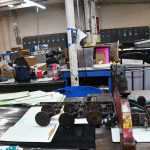Georgia Industries for the Blind gives an inside look at operations
Published 10:23 am Wednesday, January 8, 2025





|
Getting your Trinity Audio player ready...
|
Last year, Georgia Industries for the Blind (GIB) celebrated its 75th anniversary on June 27th. GIB is one of the five programs under the Georgia Vocational Rehabilitation Agency (GVRA) and has a long history of providing opportunities to legally blind individuals. The GIB employees are both sighted and non-sighted individuals. The plant maintains a blind employee ratio of 75%. The manufacturing industry has a long history that ties back to the late 30s.
In 1937, GIB was called the Georgia Factory for the Blind. The following year, the Wagner-O’Day Act was passed, requiring Government agencies to prioritize purchasing products that blind people produced. On June 27th, 1949, the first plant was opened in Bainbridge, and the name was changed to Georgia Industries for the Blind.
Four years later, a second plant opened in Griffin. In 1971, the Javits-Wagner-O’day Act was enacted, mandating all federal agencies to purchase specified supplies and services from nonprofit agencies that employ people who are blind or have other significant disabilities. For years, GIB has manufactured safety products, file folders, safety vests, pillows, individualized wrapped 3-ply face masks, customized screen printing, sewing projects, and kitting services. 90% of sales are from the Federal Program, AbilityOne – a federal program that allows federal agencies to purchase products and services from nonprofit organizations that employ people who are blind or have significant disabilities.
Trending
The National Industry for the Blind (NIB) markets AbilityOne products. The process starts with the NIB publishing products being open for bid, and GIB staff will respond to appropriate bids. Afterwards, the GIB staff will prepare documents for the bid. The facility manager in Bainbridge will determine the selling price and submit a product development plan (PDP). If NIB approves the PDP, the contract is awarded. Once the contract is awarded, customers will submit orders to GIB. Operations at Robins Air Force Base in Warner Robins run differently, primarily focusing on container reclamation.
The manufacturing industry has continued to thrive, enabling blind individuals to achieve greater financial independence. Dan West, Plant Manager for two years, stated that it takes a blind or visually impaired employee one to two months to learn how to work a machine. The learning process is supported by safety measures and having someone available to assist if needed. West also mentioned, “Some people still teach Braille for blind individuals, but it’s according to their needs. People mainly focus more on computer things.” Technology has advanced significantly, providing apps and programs, to assist blind or visually impaired people in seeing, working, and learning. Additionally, employees who frequently work with machines benefit from repetitive learning techniques.
The advancement of technology and the dedication of employees at Georgia Industries for the Blind created an environment where visually impaired or blind people can find steady employment.










